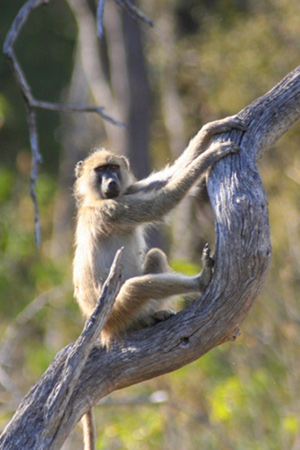The African environmental group, GeaSphere, has lodged a complaint with the Forest Stewardship Council’s (FSC) for certifying tree plantations as sustainable that are culling baboons in South Africa, as first reported by FSC-Watch. The primates are trapped with bait and then shot. According to the complaint, “unofficial numbers from reliable sources state that more than 1000 baboons have been shot over the past 2 years” in Mpumalanga Province.
Documents record permits given to cull 1,914 baboons in 13 separate plantations, however Philip Owen of GeaSphere says that plantations have refused to release official data on how many baboons have been killed.
“We are still not in a position to say exactly how many baboons had been shot, but did learn from a press article that York Timbers had killed 597 baboons in the last two years. We are aware of permits having been issued to York Timbers and Komatiland Forests,” he told mongabay.com.
Baboons, considered destructive vermin by the plantation industry, damage the non-native pines by removing their bark in the wet season. In some cases, trees die from the damage inflicted.
 Chacma baboon in Botswana. Photo by: Tiffany Roufs. |
The complaint argues that such practices go against FSC principles. A press release from GeaSphere contends: “it is obvious to us that the killing of baboons cannot be arranged with a number of the FSC principles and criteria.”
Yet John Scotcher, FSC contact person in South Africa, told mongabay.com that the baboon culling did not go against any FSC regulations. Furthermore, Scotcher said that the FSC was aware of the culling prior to GeaSphere’s complaint.
The complaint has been formally accepted by the FSC and will now be examined by an independent panel.
“Nobody from the FSC may be a member of the panel. [The panel] will consider the complaint and their findings will be binding on both the complainant and FSC,” Scotcher explained. “If the panel identifies any transgressions of local laws or the FSC Principles and Criteria, then there may be a corrective action required from the affected companies.”
The species of baboon present in South Africa is the Chacma baboon (Papio ursinus). The IUCN Red List lists the primate as Least Concern, but Owen says the fact that the species is listed under Appendix 2 of CITES (the Convention on International Trade in Endangered Species of Wild Fauna and Flora) means it could become threatened “if trade is not carefully managed.”
“Unfortunately, we know very little about baboon dynamics in the area. No scientist can tell you how many baboon troops exist in this region—the research does not exist. Even the reasons for the baboons stripping pine bark is not known,” says Owen. While locals often view baboons as pests, they are important seed dispersers according to Owen.
Plantation questions
For GeaSphere the plight of baboons in the area is a symptom of a larger environmental problem caused by large-scale non-native plantations.
“Most of this region in Mpumalanga province has been transformed to alien invasive timber plantations, and natural fauna and flora has been dramatically impacted upon,” Owen say, adding that timber plantations have replaced “biodiverse, primary grassland. In the grassland here, you can find a estimated 4000 plant species…. none of which can survive in timber plantations conditions.”
 Infant Chacma baboon in Botswana. Photo by: Tiffany Roufs. |
While no one disputes that baboons harm plantation trees, there is a wide disagreement how to best deal with the situation.
A 2006 study initiated by the timber industry found that the practice of culling baboons had not effectively stopped trees from being damage.
“Although there are, as yet, no firm data, it is clear that current control policies with respect to baboons [trapping and shooting] are not working. Baboon damage to pines is apparently increasing, despite extensive trapping and shooting and, as the data in our report show, there is no simple relationship between the amount of time that baboons spend in pine and the levels of damage. Our view, therefore, is that a new underlying philosophy is needed,” the study concludes.
The study further found that baboons did not favor plantations, but given the low food diversity available in plantations, they are ‘degraded habitat’ for baboons.
“We have no doubt that this hypothesis will not be popular, and may be dismissed out of hand. However, our professional, scientific opinion is that, at present, it is simply not possible to say that control procedures work, or that they represent a cost-effective use of […] resources,” the researchers conclude.
According to GeaSphere the study’s findings and recommendations were ignored by the plantation industry.
The FSC has faced stiff criticism in the past, including criticism from smaller environmental groups for accrediting monoculture plantations and supporting old-growth logging. In 2008, Simon Counsell, Executive Director the Rainforest Foundation UK, dubbed the FSC the ‘Enron of Forestry’. However, the organization remains supported by WWF and Greenpeace among other major environmental groups. In 2008 Greenpeace released a report arguing that FSC required large-scale reform, but should not be terminated.
CITATION: ‘Habitat Structure, Population Characteristics and Resource Utilisation by Chacma Baboons in Commercial Forestry Areas of the Eastern Mpumalanga Escarpment’, Henzi et al. 2006.
Related articles
Timber certification is not enough to save rainforests

(06/02/2010) In the 1980s and 1990s pressure from activist groups led some of the world’s largest forestry products companies and retailers to join forces with environmentalists to form the Forest Stewardship Council (FSC), a certification standard that aims to reduce the environmental impact of wood and paper production on natural forests. Despite initial skepticism on whether buyers would pay a premium for greener forest products, FSC quickly grew and by 2000 had become a standard in many markets, including Europe and the United States. Companies like Home Depot, Lowe’s, and Ikea are today strong supporters of the FSC. But the FSC has not been without controversy. In recent years some activists have voiced concern about FSC standards as well as the credibility of auditors that certify timber operations. Among the initiative’s supporters is the Rainforest Action Network (RAN), a group best known for its aggressive protest tactics. RAN says engagement with the FSC is better than the alternative: leaving the timber industry to devise its own sustainability standards.
Paper company loses green certification after rainforest destruction in Indonesia
(04/18/2010) The Forest Stewardship Council (FSC), a global certifier of sustainably managed forest, has dropped another Indonesian company for the destruction of rainforests. Asia Paper Resources International Limited (APRIL), has had its certification suspended due to evidence of conversion of rainforests for acacia plantations, the destruction of ‘High Conservation Value Forest’, draining peatlands, as well as continuing conflicts with local communities. The decision was made by the Rainforest Alliances Smartwood, an accreditation program with the FSC.
Forest certification system needs reform to ensure sustainability – report
(11/04/2008) Demand for wood products is ultimately one of the largest drivers of global deforestation through both direct clear-cutting and selective logging, which increases a forest’s vulnerability to fire and subsequent clearing and disturbance by other actors, including hunters, subsistence farmers, land speculators, ranchers and agro-industrial firms. Reducing the detrimental environmental impacts of meeting wood demand is critical to protecting the world’s forests as healthy, productive and resilient ecosystems.
Rainforest Action Network to review support for FSC certification
(10/16/2008) The Rainforest Action Network (RAN) said it would review its support for the Forest Stewardship Council (FSC), a forest products certification standard, over concerns regarding its certification of destructive logging operations. The announcement comes after a bitter campaign waged against RAN by Ecological Internet, a forest activist group.
The FSC is the ‘Enron of forestry’ says rainforest activist

(04/17/2008) On April 7th, Mongabay printed an interview with FSC International Communications Manager, Nina Haase, in which she defended the FSC against criticism leveled at it by various environmental organizations, such as The World Rainforest Movement and Ecological Internet. The interview drew strong reactions on both sides, and Simon Counsell, director of the Rainforest Foundation UK, requested a chance to respond to the FSC’s interview in-depth. In his response, he states that the FSC has created a “‘race to the bottom’ of certification standards”, alleging that the “FSC really has become the ‘Enron of forestry'”.
The FSC responds to its critics

(04/07/2008) Last month, Mongabay.com reported on recent and various criticisms of the FSC (the Forest Stewardship Council). The FSC is an international organization that certifies forest products which, according to their standards, have been harvested in an environmentally-sustainable and socially-responsible manner. Response to the article was significant. It was picked up by the Ecological Internet’s email campaign and was mentioned on numerous environmental web sites and blogs. At the time of the publication, the FSC had not responded to requests for comments. But in the following interview, FSC International Communications Manager Nina Haase answers each criticism separately and addresses several other issues, such as the FSC and climate change, the organization’s monitoring capabilities, and its adaptation to new environmental concerns. Ultimately she responds to the big question raised by critics: is the FSC stamp still credible?
FSC has ‘failed the world’s forests’ say critics
(03/26/2008) The Forest Stewardship Council (FSC) has come under increasingly harsh criticisms from a variety of environmental organizations. The FSC is an international not-for-profit organization that certifies wood products: its stamp of approval is meant to create confidence that the wood was harvested in an environmentally-sustainable and socially-responsible manner. For years the FSC stamp has been imperative for concerned consumers in purchasing wood products. Yet amid growing troubles for the FSC, recent attacks from environmental organizations like World Rainforest Movement and Ecological Internet are putting the organization’s credibility into question.














